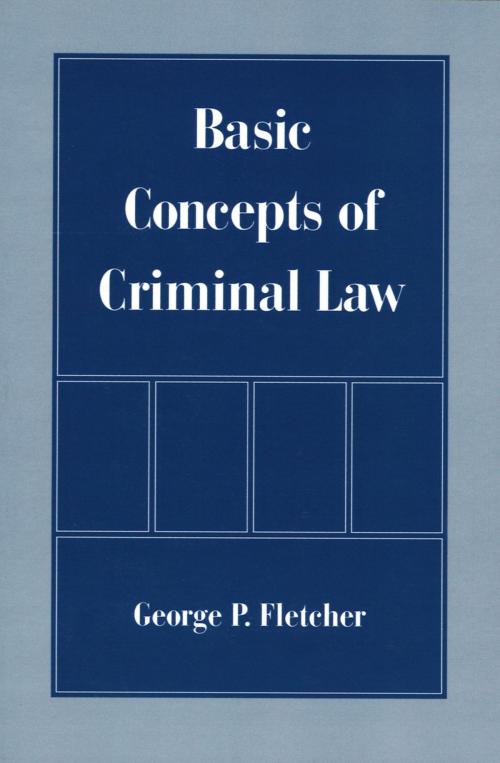Basic Concepts of Criminal Law
Nonfiction, Reference & Language, Law, Criminal law, Social & Cultural Studies, Social Science, Crimes & Criminals, Criminology| Author: | George P. Fletcher | ISBN: | 9780190623487 |
| Publisher: | Oxford University Press | Publication: | September 3, 1998 |
| Imprint: | Oxford University Press | Language: | English |
| Author: | George P. Fletcher |
| ISBN: | 9780190623487 |
| Publisher: | Oxford University Press |
| Publication: | September 3, 1998 |
| Imprint: | Oxford University Press |
| Language: | English |
In the United States today criminal justice can vary from state to state, as various states alter the Modern Penal Code to suit their own local preferences and concerns. In Eastern Europe, the post-Communist countries are quickly adopting new criminal codes to reflect their specific national concerns as they gain autonomy from what was once a centralized Soviet policy. As commonalities among countries and states disintegrate, how are we to view the basic concepts of criminal law as a whole? Eminent legal scholar George Fletcher acknowledges that criminal law is becoming increasingly localized, with every country and state adopting their own conception of punishable behavior, determining their own definitions of offenses. Yet by taking a step back from the details and linguistic variations of the criminal codes, Fletcher is able to perceive an underlying unity among diverse systems of criminal justice. Challenging common assumptions, he discovers a unity that emerges not on the surface of statutory rules and case law but in the underlying debates that inform them. Basic Concepts of Criminal Law identifies a set of twelve distinctions that shape and guide the controversies that inevitably break out in every system of criminal justice. Devoting a chapter to each of these twelve concepts, Fletcher maps out what he considers to be the deep structure of all systems of criminal law. Understanding these distinctions will not only enable students to appreciate the universal fundamental ideas of criminal law, but will enable them to understand the significance of local details and variations. This accessible illustration of the unity of diverse systems of criminal justice will provoke and inform students and scholars of law and the philosophy of law, as well as lawyers seeking a better understanding of the law they practice.
In the United States today criminal justice can vary from state to state, as various states alter the Modern Penal Code to suit their own local preferences and concerns. In Eastern Europe, the post-Communist countries are quickly adopting new criminal codes to reflect their specific national concerns as they gain autonomy from what was once a centralized Soviet policy. As commonalities among countries and states disintegrate, how are we to view the basic concepts of criminal law as a whole? Eminent legal scholar George Fletcher acknowledges that criminal law is becoming increasingly localized, with every country and state adopting their own conception of punishable behavior, determining their own definitions of offenses. Yet by taking a step back from the details and linguistic variations of the criminal codes, Fletcher is able to perceive an underlying unity among diverse systems of criminal justice. Challenging common assumptions, he discovers a unity that emerges not on the surface of statutory rules and case law but in the underlying debates that inform them. Basic Concepts of Criminal Law identifies a set of twelve distinctions that shape and guide the controversies that inevitably break out in every system of criminal justice. Devoting a chapter to each of these twelve concepts, Fletcher maps out what he considers to be the deep structure of all systems of criminal law. Understanding these distinctions will not only enable students to appreciate the universal fundamental ideas of criminal law, but will enable them to understand the significance of local details and variations. This accessible illustration of the unity of diverse systems of criminal justice will provoke and inform students and scholars of law and the philosophy of law, as well as lawyers seeking a better understanding of the law they practice.















